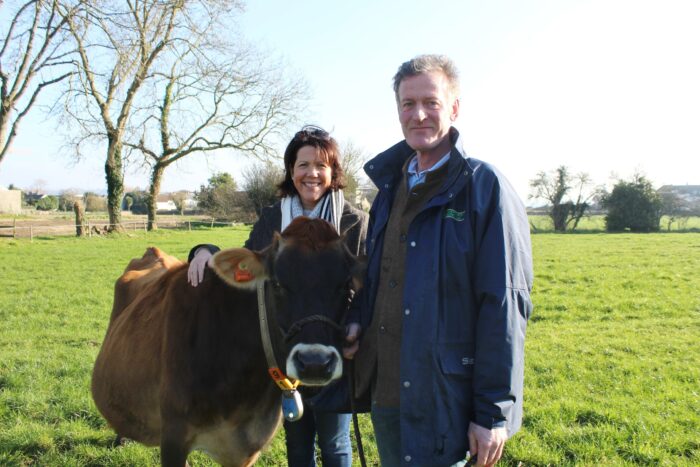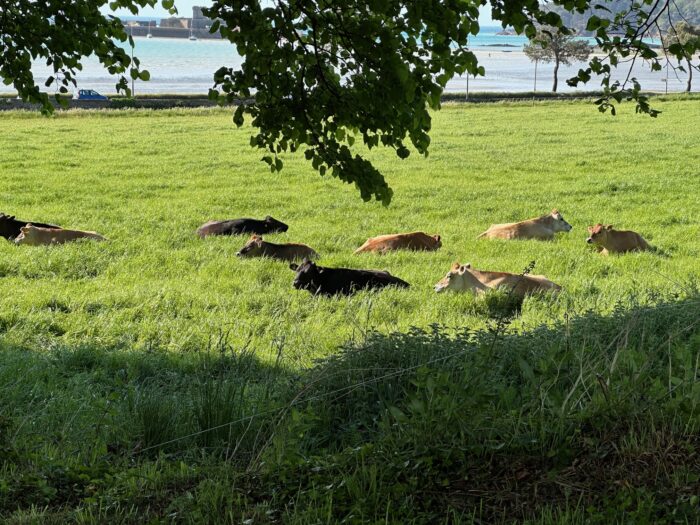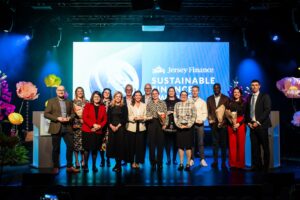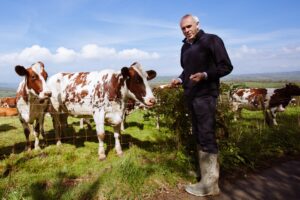
Alasdair Crosby met dairy farmer David Leng and his ‘Blanc Pignon’ herd
When, in 2023, the Atlantic Hotel was holding its annual Eat Jersey Festival, David Leng of Blanc Pignon dairy farm was asked by the hotel if their festival’s top chef could have a farm tour. David said he would be welcome to visit and have lunch afterward – he would cook for his guest
He was shocked when the visitor turned out to be the acclaimed chef, Michel Roux, then owner of the Michelin-starred restaurant, Le Gavroche, in London!
David thought: ‘Oh no! I’ve cooked this brisket and it looks slightly charred and here is Michel Roux come for lunch!’
However, David continued the story: ‘Michel was unbelievably nice. He particularly liked two of our products: our salted butter, which he said was some of the most delicious butter he’d ever eaten, and our Black Butter gelato, which he called “Jersey in a pot”. I was so pleased!’
Blanc Pignon Farm at Beaumont, in business-speak terms, is a ‘vertically integrated food producing company.’ Input comes from the dairy herd – 86 cows, probably around 210 animals in total, youngstock and beef animals. The dairy products are produced from the farm’s own animals, and include a whole range of items, many of them being a ‘Jersey-take’ on products that come from the Balkans and Middle East, yoghurts, cheeses and yoghurt-type drinks.
Then there are the beef products: about eight years ago he crossed some of his Jersey cows with the Japanese Wagyu breed, which creates superb marbling in the beef.
‘The quality of the meat is fantastic,’ he said. ‘The Wagyu are famous for their marbling within the muscle and their fat content. Jersey cows are also naturally very marbled and have great fat content, but adding the wagyu has just given the marbling an extra ramp up. it has slightly changed the texture of the beef, and it’s incredibly popular.’
And, of course, he produces lots and lots of burgers: he supplies the beef burgers sold at El Tico and the wagyu burgers at the moorings. apart from those two outlets, the meat is sold directly via his own mailing list: he sends out an e-mail whenever stock becomes newly available: ‘barring a few bits and pieces, we sell all the meat available within three hours. It’s first come, first served.’
Becoming a dairy farmer might seem like driving in the opposite direction to the queue of traffic clogging up the other side of the road. But David has done just that — he has become a first-generation farmer, by virtue of inheriting one of the Island’s oldest established dairy herds. The origins of the Blanc Pignon herd go back to the Occupation years, when the then owner, Tottie Resch, bought two Jersey cows. This was expanded and in due course the herd was inherited by her daughter, Vera. When Vera Le Cras died in late 2015, the herd was left to Vera’s two daughters, Caroline and Alice; it is Caroline’s husband, David, who is now the active ‘hands-on’ farm manager.
Until he came to live in the Island with Caroline and their young family, he knew nothing about dairy farming – trees, yes; cows, no.
‘I was a farmer of trees back in Sussex before moving to Jersey. I ran a tree business for 24 years – arboriculture rather than agriculture. But the care for your end product is the same: you have to care for trees just as you have to care for cows. I was always in favour of trees and felt it was my duty to fight the tree’s corner and help educate the public on the right way to care for trees.
‘As a result, I probably lost out on an awful lot of work, because potential customers would come to me and say: “I want to put a building up here and this tree is in the way,” to which I would respond: “Put the building elsewhere because this tree is not budging” So someone else would do the work and the poor tree would be gone, anyway.’
When they moved to Jersey in 2014 to be closer to Caroline’s parents, David knew that there was no scope for yet another tree surgeon or tree expert in a place where this profession was already well represented. But with the family dairy farm just a few minutes away from where they lived, he was quickly helping out there.
Starting by doing the branchage and odd jobs about the farm, he became progressively more involved until he took over the management of the farm in 2017.
He has the help of his herd manager, Alan Gamble and general assistants Carlos Aires and Gabriel Gomes. In the commercial kitchen created out of a former barn, he is helped by India and Sarah.
The production business was started in 2021, after lots of research and experimenting with flavours.
‘We are still proud members of the Jersey Dairy, but we just felt there was room for us to diversify and start making some of our products, to which, after negotiation, the Dairy agreed. We do not make our own ice cream so as to avoid competition with them.
So what do they make? He listed the products: ‘Gelato, Moolloumi cheese, yoghurt, kefir and butter. Then there are the meat cuts that we produce in the butchery unit.
Really, the business has just grown exponentially. It’s been fantastic.’
The names of some of the dairy products seemed a bit mysterious, so David helpfully explained: ‘We make about nine different flavours of gelato, which is like an ice cream, but with a lot less cream and a lot less air. Mr Whippy is about 85% air — we’re probably missing a trick by not selling air! Jersey milk, as we know, is absolutely full of fat and cream and loveliness, whereas Italian “Gelato’ comes from cows that are not so fat-rich. But we make our Gelato with our own full-fat milk, from cows that are kept about 70 metres away from our production site. No food miles then.
‘There are two different styles of cheese. The first we call Moolloumi (after the Cypriot product, Halloumi) in four separate flavours. and a Shankleesh – a Lebanese mezze cheese, which is strained yoghurt, rolled in Za’atar, a Middle Eastern herb blend. It is a delicious little soft cheese, stored in olive oil, great on a biscuit or in a salad.
‘We make macarons, using the egg whites left after using the yolks for the gelato. We make a lot of our own Greek-style yoghurt. It is strained, completely natural, with nothing added to it, apart from the cultures. Then there is the Kefir, a fermented milk drink, like slightly sour yoghurt, coming from eastern Europe, although there are plenty versions of it in various countries; in Mongolia it is made with yak milk. Basically, it is a great gut-health drink. Also, there is the salted butter that Michel Roux so enjoyed.
‘Last year we started to cold smoke some of our Moolloumi cheese flavours, and the butter. Halloumi in Cyprus is a mixture of sheep and goat and cow milk; our Moolloumi is just purely cows’ milk.’
They sell their dairy products to the major branches of the Co-Op and to a number of small stores around the Island.
The other side of their business is the beef: ‘We do any kind of cut from a beef carcass that our customers might want.
‘I love my food,’ David said, ‘and I think it’s really important to celebrate the Jersey cow, and the Island’s connection with its locally produced food., and also to get away from industrially made, imported supermarket products.
‘We just try to make people more aware of where their food comes from, and how much food is produced locally. Local provenance is so very important. Of course, we can’t supply all the beef and all the dairy products that Islanders want to buy, but we can go a long way to supplying quite a bit of it.
‘Yes, local produce can cost a bit more, just like so much else in the Island. The costs of production are always higher in a small island than they would be in the UK. But then, what price local? Everybody talks about saving on food miles and carbon footprints, and then they buy beans from Kenya and strawberries out of season from South America that don’t taste half as good.
‘We sell lots of Moolloumi, for example, to places like Le Braye, or the two cafés at the Zoo. Their customers don’t seem to turn their noses up at it because of the higher price.’
Did he have a farm shop to sell directly to retail customers? No, he replied. If you have a shop, you have to man it, which is fine in the summer, but not so great on a cold and rainy winter’s day, when the shop needs to be heated and you may only sell one pack of butter all day.
‘Customers can order off our website, and can collect their purchases from us by arrangement.’
David said he had always been an ‘outdoor boy’ and office life was never going to be for him – but being a dairy farmer, even at a time when the number of separate herds is diminishing, is a way of life that he finds totally fulfilling.
As he said: ‘‘I just love it – and love seeing the improvements to the farm. Things can only get better. I am sure that Vera, my mother-in-law and passionate farmer, would be very proud if she were here today, and glad that her farm is thriving.’

This article was first published in the Jersey Evening Post and is reprinted with their kind permission




